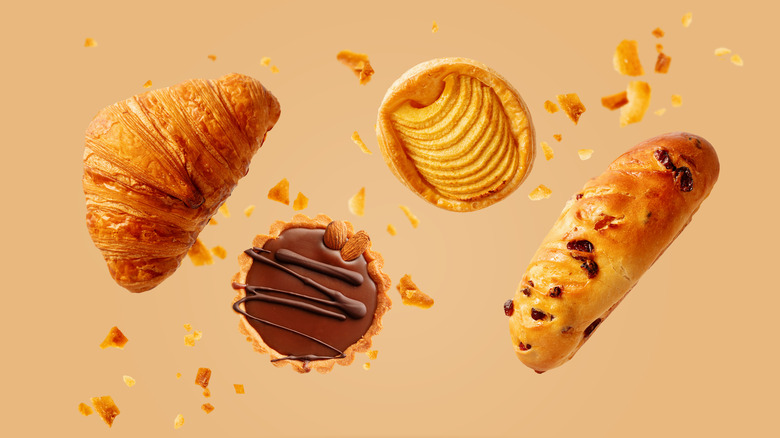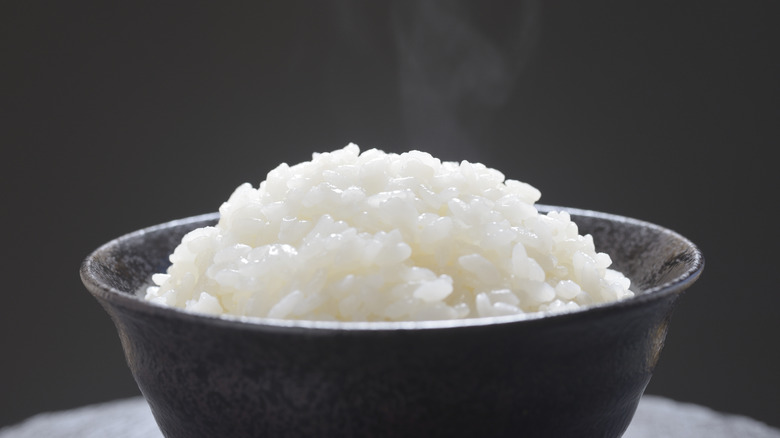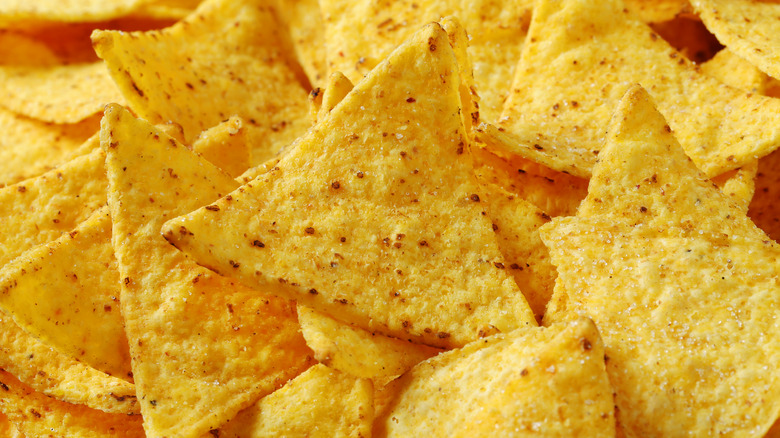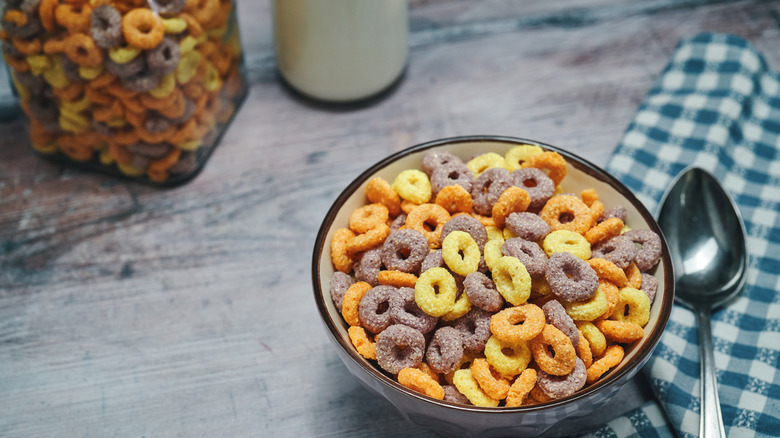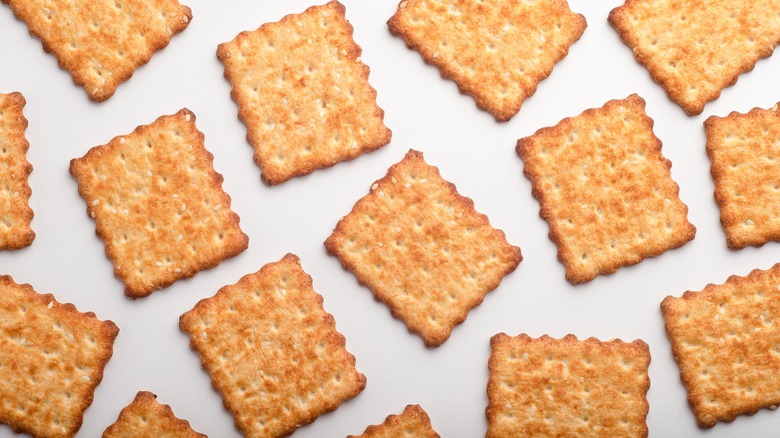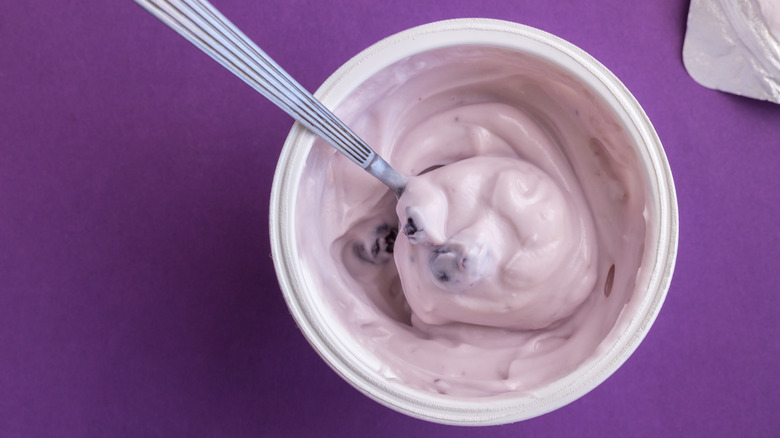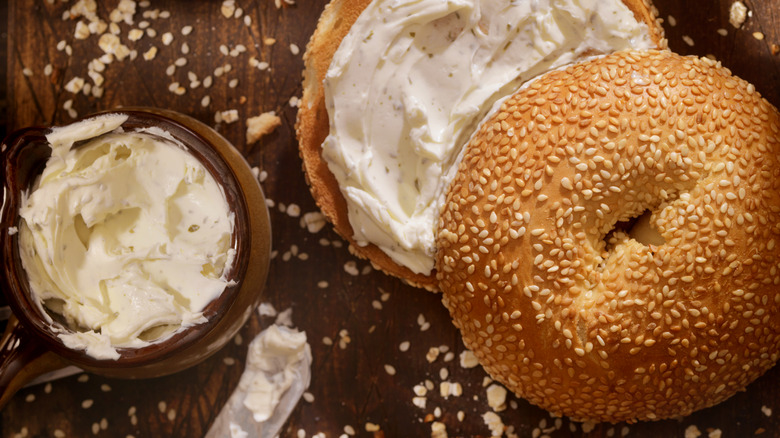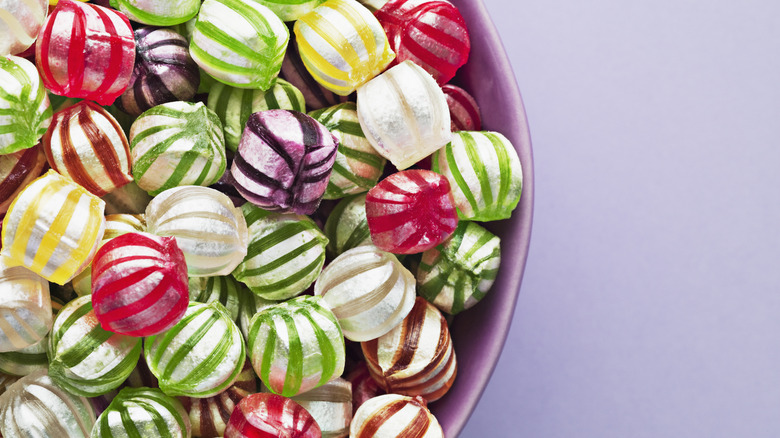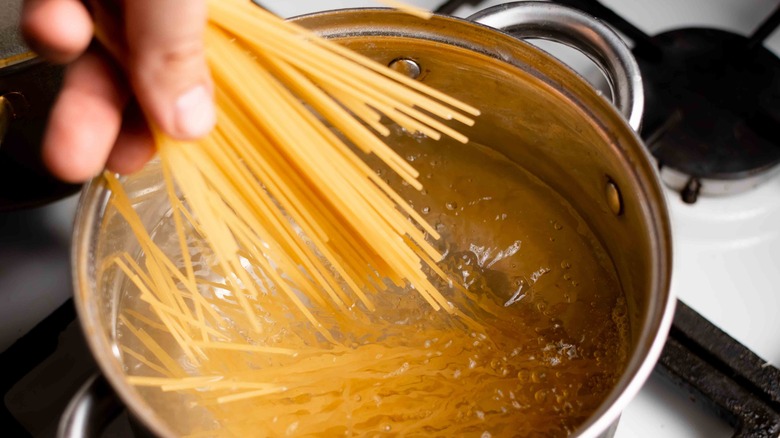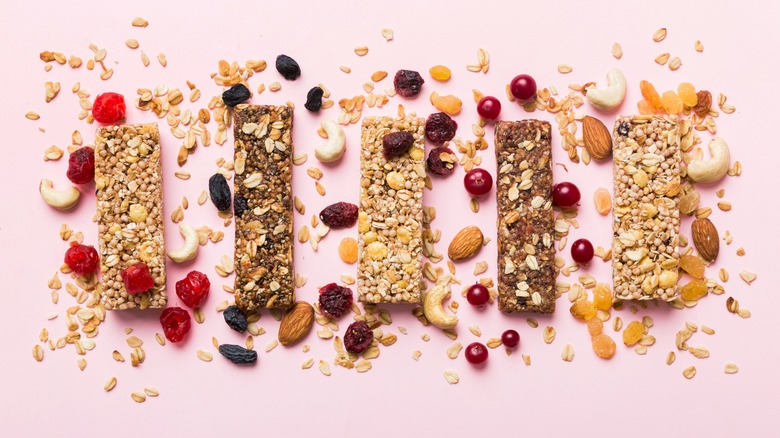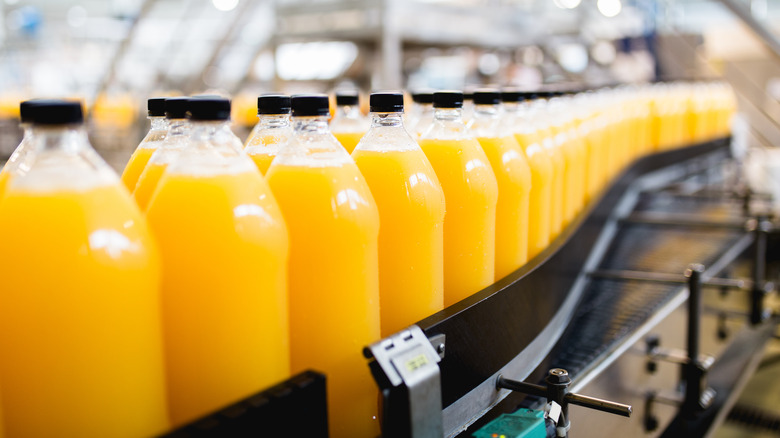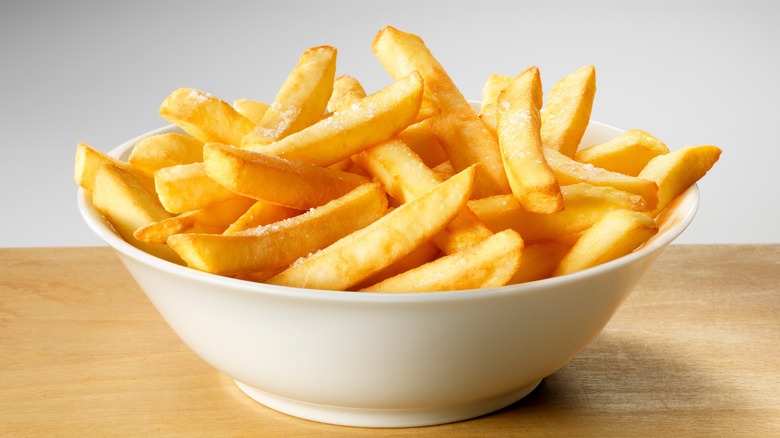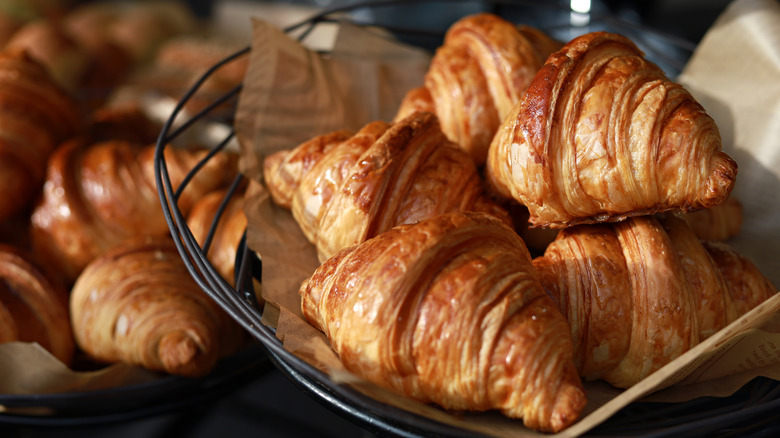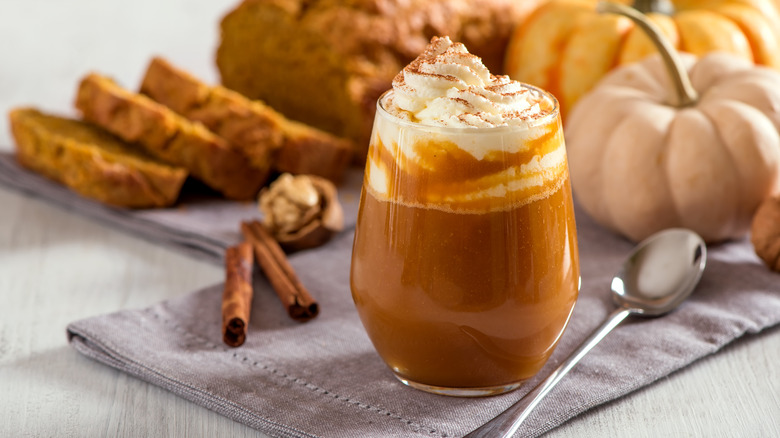14 High-Carb Foods You Might Want To Avoid
There are few nutrients that are as heavily-discussed as carbohydrates. One of the fundamental food groups in human and animal diets is carbohydrates, which comprise starches, fiber, and sugars, and foods that contain carbs have these three different elements in various combinations. While sugars and starches provide our bodies with the energy that carbs deliver in such high quantities, allowing us to go through our days, fiber helps to control our digestion and energy regulation, according to USA Today.
Carbs can exist comfortably in a healthy diet, but in recent years, there has been nearly endless discussion about the role of carbs and their impact on weight gain and blood sugar. The truth, though, is that carbohydrate-containing foods vary in healthiness considerably, as suggested by a study at Harvard T. H. Chan School of Public Health, and whether you're eating more or less of them, it's the type you choose that has the most effect on your overall wellness. Certain high-carb foods can be unhealthy despite seeming like they're a nutritious option or being a core part of many people's diets.
In this article, we decided to focus on high-carb foods that provide simple energy or a large amount of sugar, which can cause your blood sugar to rise, according to the American Medical Association. We also highlighted high-carb foods with little nutritional benefit apart from their energy content and carbohydrate-containing options that are also laden with other unhealthy ingredients.
1. White rice
White rice is an integral part of diets all over the world and is one of the most readily available carbohydrates out there. Cost-effective and simple to cook, just 100 grams of raw long-grain white rice provides 80 grams of carbohydrates, giving you a huge amount of energy for your buck. However, this doesn't necessarily make it a healthy option.
White rice is a refined grain that gets its carbohydrates mainly from starch and which has a low overall fiber content. These traits can make it more impactful on health than whole-grain counterparts like brown rice, with one study published in BMJ finding that higher white rice consumption was associated with a higher rate of type 2 diabetes. While white rice does contain some vitamins and minerals, it's pretty heavily outweighed on this front by other whole grains, like brown rice, which is more nutritious overall.
Having said this, there's no reason why white rice can't be part of a healthy diet, and as one of the most fundamental carbs out there, it's not going anywhere. However, it may be worth balancing out your white rice consumption with higher-fiber brown rice, which also has a nuttier, more complex taste.
2. Tortilla chips
Crunchy, salty, and the perfect vehicle for guacamole and salsa, tortilla chips are beloved by pretty much everyone. However, this high-carb food, which contains 73 grams of carbs per 100 grams of regular chips, is usually fairly low in nutrition. Tortilla chips can sometimes be considered a healthier snack, but in reality, they're made from simple corn tortillas that have been sliced up and usually deep-fried. As such, they have little value over other high-carb, salty snacks. "There really is not a tremendous difference nutritionally between standard potato chips and tortilla chips," says registered dietitian Alicia Romano via Boston Magazine. "Generally speaking, a one-ounce serving contains about 130-150 calories, 15 grams of carbohydrates, 1-2 grams of fiber, and 6-10 grams of fat. The biggest difference is the potato versus corn base."
Additionally, tortilla chips suffer when stacked up against potato chips due to the high amounts of trans fats that are often in them. Trans fats are widely renowned as being the unhealthiest type of fat there is, with their ability to raise bad cholesterol levels rapidly proving damaging to arteries, according to the Harvard T. H. Chan School of Public Health. Tortilla chips can also be high in sodium, even in small portions.
3. Breakfast cereals
Breakfast cereals are one of the quickest breakfast items out there, and their ability to provide instant energy is part of what makes them so popular. That effect, though, is unfortunately often created by the huge amounts of sugar in many popular brands at the expense of other nutrients. "Most breakfast cereal is lean in the protein and fiber department and rich in the sugar department, it often leads us high and dry looking for more and more," explains registered dietitian Tracy Lockwood Beckerman via Well and Good. In 100 grams of Cap'N Crunch, for example, there are 86 grams of carbohydrates, and over 44 grams of these come from sugar.
This large quantity of sugar, unmoderated by other nutrients, causes a high blood sugar, quickly followed by a rapid drop. This creates a cycle where you seek to replace the lost sugar in your bloodstream with more sugar, causing some individuals to make less healthy dietary choices throughout the day, according to a medically reviewed article on WebMD. Additionally, a lot of breakfast cereal options go through rigorous processing to get to the table, states Lockwood Beckerman. This means not only that they can end up full of artificial ingredients or additives, but they're also stripped of any inherent vitamins and minerals they once had.
4. Crackers
How problematic can a simple cracker be? As it turns out, it's pretty problematic. Crackers may be small and unassuming, but they're often totally unsatisfying, "Crackers do not stave off hunger well," says the Cleveland Clinic's certified diabetes educator and registered dietitian Gillian Culbertson via WebMD. This is down to their typically low-fiber composition, with regular crackers commonly made from refined white flour.
The combination of these two things creates a quick blood sugar spike, according to Levels Health, which can then leave you hungry and reaching for the crackers once more. This, combined with their small size, can make it very easy to eat too many, leaving you consuming more food than you might like. To add to this, crackers can often be higher in sodium than you might think, and they may also be surprisingly fatty. Just five Ritz crackers, for example, weighing in at 16 grams, contain 4.5 grams of fat and a gram of saturated fat, 105 milligrams of sodium, and no fiber. It's important to remember that all of these nutrients are also being served up with barely any vitamins and minerals to show for them, making crackers largely empty calories.
5. Fruit yogurt
The combination of vitamin-rich fruit and protein-abundant yogurt should be a winner. However, too many food manufacturers stop their products from being so due to the high amounts of sugar they use. Some popular fruit yogurt brands are swimming in sugar, with certain options containing a huge proportion of your added sugar daily value per day. One single serving of Yoplait Original Strawberry, for example, contains 13 grams of added sugar. Given that the American Heart Association recommends you consume no more than 24 grams of added sugar daily, this carb-rich food starts to look pretty unhealthy, according to Harvard T. H. Chan School of Public Health.
This tends to be a particular issue with low-fat yogurts, which tend to use more carbohydrates to create flavor in the absence of fat. Fortunately, you can avoid all of this by opting for a simpler yogurt choice. Skip fruit and flavored yogurts entirely and go for a classic Greek yogurt, topping it with some fresh berries or sliced fruit. You'll get some crucial fiber from the whole fruit, keep the added sugar content low, and you'll be able to benefit from the high protein and probiotic effect of the yogurt, as noted on WebMD.
6. Bagels
Bagels make a delicious alternative to sliced bread, and their chewiness and density are definitely moreish. Their textural qualities, however, don't mean that they're much healthier than regular white bread. Bagels are most commonly made with refined flour, the same type of flour that goes into supermarket white loaves, and this flour means that they're high in carbs but low in fiber. In the average 100-gram white bagel, you'll get almost 54 grams of carbohydrates and a mere 1.9 grams of fiber.
Because refined flour is a high-GI food, it causes large spikes in blood sugar, which in turn prompts more insulin release — and all of this can get in the way of weight loss, says MedicineNet. It's also worth bearing in mind that, unlike regular white bread, bagels can often be flavored and have sweet additions like dried fruit, cinnamon-infused sugar, and even chocolate. These extra ingredients add further sugar content and carbs to the bagel without adding much extra fiber, thereby making its effects on blood sugar even more pronounced.
7. Candy
It probably doesn't surprise you that candy isn't super-nutritious, as high-carb foods go. Exactly how unhealthy it is, however, may surprise you. Most types of candy are made primarily from sugar, delivered either through regular granulated white sugar or through liquid sugars like corn syrup. This high sugar content is what, of course, gives it its sweetness, but its lack of additional ingredients means that it's also pretty much completely devoid of any vitamins, minerals, fiber, or protein. As such, you're essentially eating completely empty calories.
In addition to this, candy can often be made with artificial food dyes like yellow 5 and 6 or red 40, which have long been associated with hyperactivity in children, according to Healthline. All of this combined means that candy is an energy-inducing snack that won't sate your hunger in any way and will add significantly to your added sugar intake, increasing your risk of chronic diseases, warns Everyday Health.
Furthermore, it's worth bearing in mind that healthy candy choices, which use ingredients like organic cane sugar or claim to be gluten-free, aren't any healthier than regular candy. Organic cane sugar has exactly the same impact on your body as regular sugar does. While gluten-free candy is great for celiacs, according to Healthline, the truth is that a lot of candy is naturally free of gluten, so this claim is somewhat of a marketing gimmick.
8. White pasta
We're sorry, spaghetti lovers: White pasta just isn't that good for you. Now, as carbohydrate sources go, pasta itself isn't the worst. This high-carb food contains just over 30 grams of carbohydrates per 100 grams of cooked product, with the majority of its weight made up of water. Despite being full of carbs, it also contains some important minerals and vitamins and prompts a fairly low glycemic response, meaning that it may not be as impactful on your weight as some other foods. In fact, a study published in Pub Med found that pasta consumption, when part of a healthy diet, doesn't specifically cause weight gain.
However, there's no getting around the fact that white pasta is frequently made from unhealthy, low-fiber refined flour. Eating too much of this flour, via high quantities of pasta or other sources, has been associated with a greater risk of type 2 diabetes and heart disease, according to BBC Good Food. Furthermore, if refined flour isn't enriched, it has no vitamins or minerals inside it, as these are stripped away during production. The far smarter choice nutritionally is to try and eat whole wheat pasta wherever possible. Whole wheat pasta has way more fiber and gives you more pasta for fewer calories than the white flour alternative.
9. Granola bars
Granola bars are arguably one of the greatest examples of a food that should be healthier than it is. "I think the public perception is that if there is the word granola in it that it's healthy for you," says Ottawa's Bariatric Medicate Institute medical director Yoni Freedhoff via Lifehack. Indeed, these high-carb foods tend to be branded in ways that emphasize wholesomeness and nutrition, with healthy-looking oats and nuts prominently displayed.
Their nutritional labels, however, tell a different story. "There's a lot of things that sound healthy but then tend to get stuck together with lots of sugar and lots of high-calorie fats," says Freedhoff. Granola bars are often abundant in sugary ingredients like corn syrup, which provides no nutritional value, or refined vegetable oils that deliver fat without any vitamins or minerals. What's also confusing is the fact that while granola bars are often full of fiber-rich ingredients like nuts and oats, they often contain little fiber content at all. As a result, nutritionally granola bars can be barely any healthier than regular candy bars.
10. Fruit juice
Whether fruit juice is healthy or not has been debated for a long time, and we're here to settle the score once and for all: Unfortunately, it's not that good for you. While fruit juice might be ever so slightly better for you than a sugar-filled fizzy drink, it's still full of sugar and carbs at the expense of lots of other things. ”When you turn fruit into juice, you are losing the insoluble fiber, which is an essential nutrient and helps delay absorption of the sugar. Take the fiber away and you're just drinking sugar and calories," explains obesity expert Robert Lustig via BBC Good Food.
Even fruit juice that has pulp in it isn't that good for you. A cup portion of 100% orange juice with pulp included still contains 22 grams of sugar with no fiber. It's also important to note that although fruit juice does have vitamins and minerals in it, and usually a fair amount of vitamin C, you can get these from a supplement without any of the sugar that the drink brings. You're far better off getting your fruit flavors from fresh fruit, which will give you a pure taste while also delivering the insoluble fiber required for your body to process the sugar properly.
11. French fries
Potatoes are one of the most frequently consumed high-carb foods around the world. However, how you prepare and consume them makes a big difference in how healthy they are. french fries, which are made by submerging potatoes in a deep-fryer, are a surefire way to make the tuber less nutritious, and high consumption of them may prompt certain health effects. One eight-year study published in The American Journal of Clinical Nutrition found that eating fried potatoes regularly seemed to be associated with a greater risk of mortality overall. The same study also looked at the mortality risk when consuming unfried potatoes and found that there was no increase.
The study's authors noted that the higher risk of mortality could well be because of the high levels of fat and added salt in fried potatoes and french fries, which can add significant amounts to your overall daily intake. One large portion of McDonald's fries delivers 23 grams of fat alongside its 65 grams of carbs, with 400 milligrams of sodium as well. This fat content, and particularly the saturated fats that come with it, may prompt a greater risk of cardiovascular disease and obesity, per the World Health Organization.
12. Ice cream
It doesn't take a food scientist to figure out that ice cream isn't an all-natural, super-healthy dessert. Nonetheless, it's still worth pointing out that it's one of the least nutritious desserts out there. Ice cream is dense with added sugar and fat, which both raises its carbohydrate content and makes it eat into your daily fat allowance. Single servings of ice cream can frequently have more than half of your daily value of saturated fat for the entire day in just a few spoonfuls and contain 20 grams or more of added sugar.
When you take into account the fact that ice cream also rarely has any fiber in it, is usually low in protein, and doesn't have any significant amounts of vitamins and minerals apart from calcium, it doesn't look too good. Some types of ice cream may also contain artificial flavorings or colorings, and they can also have ingredients that improve texture or stabilize the mixture, like carrageenan. Unfortunately, these same ingredients may not be the healthiest. Take carrageenan, for instance. Although carrageenan is approved for use in foods, it's also been associated with gastrointestinal symptoms like bloating or irritable bowel syndrome, according to MedicineNet.
13. Pastries
For many, pastries are a luxurious way to start the day. Luxurious, however, doesn't equate to health. Pastries of all kinds are high-carb foods made with white flour, with a single ounce of puff pastry providing 13 grams of carbohydrates. Because this flour is refined, however, it means that pastry generally contains barely any fiber at all and not a lot of nutrition besides.
Processed, packaged pastries are, unfortunately, the worst offenders. These breakfast items are usually loaded not just with refined flour but also sugar, artificial ingredients, hydrogenated oils, and trans fats, warns registered dietitian Keri Glassman via Today. Hydrogenated oils can contain saturated fats, and the overconsumption of these can cause your blood cholesterol levels to rise, which may result in more risk of health conditions, per BBC Future. Trans fats also have this effect on cholesterol, meaning that pastries create a one-two punch on your overall health. Throw in all that added sugar, which can be even higher, depending on any fillings that your pastry might have, like jams or syrups, and you've got a recipe for a breakfast that tastes good but is hardly healthy.
14. Sweetened coffees
For folks who love fall, the arrival of the pumpkin spice latte is basically a national holiday — but what impact do these sweetened coffees have on your health? Pumpkin spice lattes and other super-sweet caffeinated beverages are often surprisingly high in sugar, creating a high-carb drink. One grande pumpkin spice latte from Starbucks, for example, contains an enormous 50 grams of sugar, and approximately 32 grams of this is added sugar.
This means that one PSL contains almost the entirety of the American Heart Association's recommendation of 36 grams of added sugar maximum for men in a single day and vastly exceeds its guidelines of 25 grams daily for women. This is also sugar, which essentially has no purpose in the body due to the fact that it has no vitamins, minerals, or fiber and does little more than make our blood sugar rise rapidly, according to Better Health. This isn't just exclusive to pumpkin spice lattes, of course: Any hot drink that has a pump or two of syrup in it will start to skyrocket in sugar content. Sweetened coffees are also frequently high in fat and saturated fat, with a Starbucks Pumpkin Spice Latte containing almost half of your daily value for saturated fat in a grande portion.
